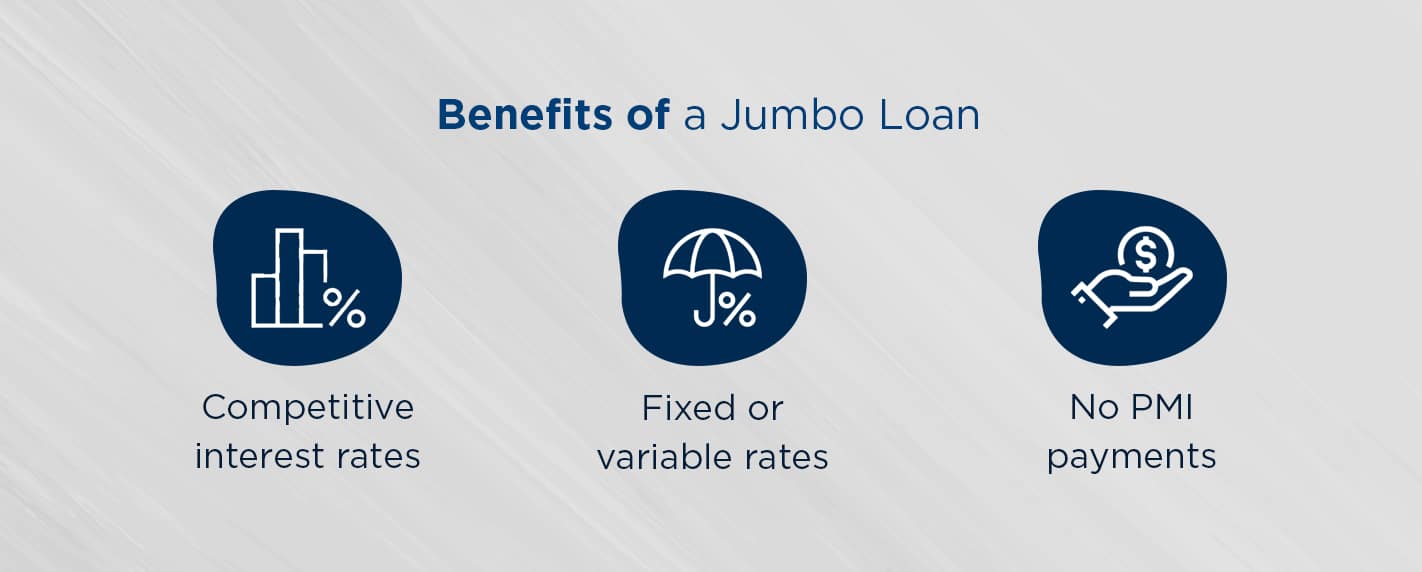Browsing the Jumbo Loan Process: Professional Tips for Protecting Your Dream Home
Browsing the Jumbo Loan Process: Professional Tips for Protecting Your Dream Home
Blog Article
Discovering the Perks and Features of Jumbo Loans for Your Following Home Purchase Choice
As the genuine estate market advances, understanding the complexities of jumbo financings becomes increasingly relevant for potential property buyers thinking about high-value residential or commercial properties. To completely appreciate exactly how jumbo finances can affect your home acquisition strategy, it is essential to discover their vital features and benefits in higher information.
What Is a Jumbo Lending?

Jumbo car loans are frequently utilized by customers seeking to purchase high-value properties or homes in pricey markets. jumbo loan. Provided the bigger quantities borrowed, loan providers typically enforce stricter credit history requirements, including higher credit report, reduced debt-to-income ratios, and bigger down settlements. The passion rates on big loans might be slightly more than those on adhering financings, mirroring the raised threat for loan providers
In addition, the authorization procedure for a jumbo lending can be extra time-consuming and complicated, as lending institutions need substantial documentation to evaluate the borrower's financial security. Comprehending these nuances is vital for potential home owners taking into consideration a jumbo finance for their residential property financing requirements.
Trick Advantages of Jumbo Loans
One considerable advantage of big lendings is their ability to fund higher-priced residential properties that exceed adjusting loan limitations. This feature makes them an attractive choice for purchasers aiming to purchase deluxe homes or buildings in high-cost areas where rates commonly surpass conventional lending thresholds.
Furthermore, jumbo fundings frequently come with adaptable terms and affordable rates of interest, enabling customers to tailor their financing to suit their one-of-a-kind economic scenarios. jumbo loan. This adaptability can consist of choices for variable-rate mortgages (ARMs) or fixed-rate fundings, supplying purchasers with the ability to handle their month-to-month repayments according to their preferences
One more advantage is that jumbo finances do not need exclusive home mortgage insurance policy (PMI), which can significantly minimize the general price of the lending. With PMI frequently being a substantial cost for standard finances with low deposits, preventing it can result in considerable savings with time.
In addition, borrowers of big financings normally have access to higher lending amounts, allowing them to buy homes that meet their way of life needs. This gain access to empowers buyers to act emphatically in competitive actual estate markets, securing their preferred homes more successfully. Overall, big fundings provide essential benefits for those looking for to fund costs homes.
Qualification Requirements for Jumbo Financings
Jumbo finances include certain eligibility needs that potential consumers have to meet to protect financing for high-value buildings. Unlike conventional financings, which have established restrictions based upon the adapting loan limits established by government-sponsored entities, jumbo financings go beyond these limits, necessitating more stringent criteria.

Moreover, big loans commonly necessitate a considerable down settlement, typically varying from 10% to 20% of the acquisition price, depending on the lender's policies and the debtor's economic situation. Satisfying these qualification needs can position customers favorably in protecting a big lending for their preferred residential or commercial property.
Contrasting Jumbo Finances to Traditional Loans
Recognizing the differences in between standard lendings and jumbo finances is necessary for buyers browsing the premium property market. Jumbo fundings surpass the conforming lending limitations established by the Federal Real Estate Financing Firm (FHFA), which suggests they are not eligible for acquisition by Fannie Mae or Freddie Mac. This results in various underwriting criteria and needs for customers.
On the other hand, traditional loans typically follow these limits, enabling for a much more structured authorization process. Big finances commonly require stricter credit rating, bigger deposits, and better monetary gets. While a traditional car loan may require a down settlement of as little as 3% to 5%, jumbo financings normally necessitate a minimum of 10% to 20%.
Rates of interest on jumbo loans might differ from those of traditional financings, usually being slightly higher due to the increased danger loan providers think - jumbo loan. The capacity for significant funding can be beneficial for buyers looking for high-end residential properties. Ultimately, recognizing these distinctions enables property buyers to make enlightened choices, aligning their funding options with their special purchasing demands and financial circumstances
Tips for Protecting a Jumbo Car Loan
Securing a big car loan needs careful preparation and prep work, Continued as lending institutions commonly impose stricter requirements contrasted to conventional financings. To improve your chances of authorization, start by inspecting your credit report and attending to any concerns. A rating of 700 or higher is usually chosen, as it demonstrates creditworthiness.
Next, collect your economic documents, consisting of tax returns, W-2s, and bank statements. Lenders usually call for thorough evidence of earnings and assets to analyze your ability to repay the financing. Keeping a reduced debt-to-income (DTI) ratio is additionally important; aim for a DTI below 43% to improve your application's competitiveness.
In addition, take into consideration making a bigger down repayment. Numerous lending institutions seek at the very least 20% down for jumbo fundings, which not only reduces your financing quantity but likewise signals economic security. Involving with a well-informed mortgage broker can supply important understandings right into the process and assist you browse numerous lending institution choices.

Verdict
In recap, jumbo fundings existing significant advantages for homebuyers looking for buildings that exceed standard financing restrictions. Thorough understanding of both the needs and advantages connected with big loans is vital for making notified home acquisition decisions in an affordable real estate market.
The rate of interest rates on my website jumbo finances might be somewhat higher than those on adapting lendings, mirroring the enhanced threat for lending institutions.
While a conventional financing might call for a down settlement of as little as 3% to 5%, jumbo loans normally necessitate a minimum of 10% to 20%.
Rate of interest prices on jumbo fundings might vary from those of standard lendings, usually being somewhat greater due to the increased danger lending institutions assume.Protecting a big funding calls for careful planning and prep work, as lenders often enforce stricter demands contrasted to traditional fundings. Numerous lending institutions look for at the very least 20% down for big finances, which not just lowers your lending amount however also signals monetary stability.
Report this page